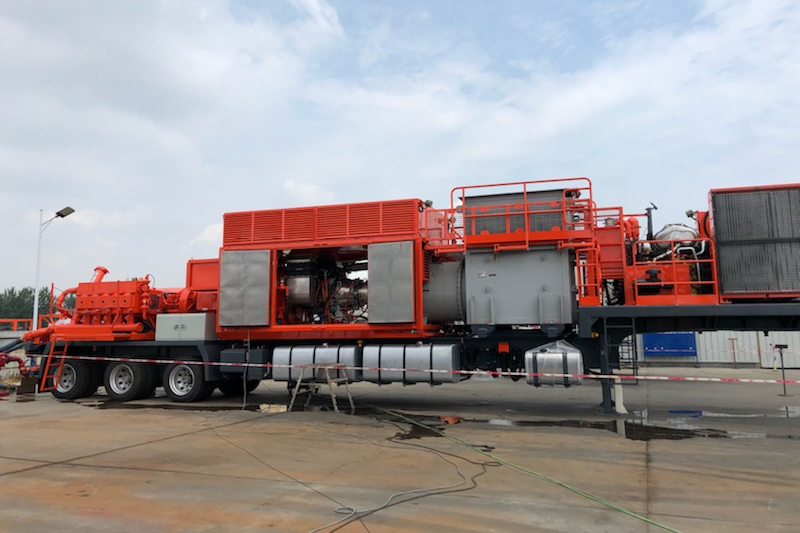One of the principle costs and logistical challenges facing well service operators at a well site is the provision of fuel for the engines driving the equipment. In fact, fuel costs can account for 20% of well completion costs. Typically, liquid fuel such as diesel fuel is trucked in as needed. This results in significant cost, and both logistical and environment issues at the well head site. Now, with the abundance of natural gas from the very successful shale play exploration and production, operators have begun looking at using the natural gas being produced as fuel for the equipment located at remote sites. Early experience has shown that using well head natural gas can be advantageous over liquid fuel, even at today's lower liquid fuel prices.
Diesel engines inject natural gas into the engine not via the fuel system, but rather by mixing it with the air entering the engine. Currently, the use of well head natural gas is limited by the ability of the diesel engine to operate in this bi-fuelmode. Excessive substitution rates can reduce the torque/power output of diesel engines. Liquid fuel substitution rates as high as 70% have been reported, however, a more representative substitution rate based on the total operating cycle is in the 50% range. One environmental concern with bi-fuel systems is a phenomenon called "methane slip" in which not all of the natural gas supplied to the engine is burned. The unburned natural gas is exhausted by the engine. Much concern has been voiced about the environmental effects of methane slip.
Vericor Power Systems gas turbines are equipped to operate on either 100% liquid fuel or 100% natural gas, depending on the type of fuel available. The fuel is provided via the engine fuel system and therefore no fuel mixing is required. More importantly, Vericor gas turbines are able to switch between liquid and gas fuel "on the fly" while operating under full load. Consequently, if there is an interruption with one fuel source, the gas turbine can be switched to the other fuel without disrupting the hydraulic fracturing process. The changeover is completed automatically -no adjustments to the fuel system are needed. The unit simply changes the fuel source in a fully controlled manner. The savings associated with burning 100% well head natural gas are compelling, especially in today's challenging marketplace. The environmental benefits of eliminating liquid fuel are equally attractive. Since the natural gas is supplied through the normal fuel system, there is no methane slip associated with gas turbine operations.
As an alternative to using well head gas as the fuel source for the gas turbine, some operators have considered trucking inLiquified Natural Gas (LNG) or Compressed Natural Gas (CNG) to the well head sites. While this avoids the on-site fuel treatment process, the preferred approach is to treat well head natural gas in situ to avoid fuel transportation costs. Well head gas treatment is safe, proven and cost effective. In fact, some suppliers will treat well head gas on a fee per standard cubic foot basis. Another option used in some shale plays is to use gas from nearby pipelines to fuel hydraulic fracturing equipment.Each of these methods has its own advantages and disadvantages based on the conditions at the site. Analysis of these options by Well Service Providers is required to select the best option for a specific site.Regardless of any logistical issues, natural gas is quickly becoming the preferred fuel, displacing liquid fuel.
Using gas turbines powered by 100% well head natural gas for fracing not only provides cost and environmental benefits, but also reduces the number of trailers required at a well site, allowing the size of the pad to be reduced. Vericor's 5000 shp gas turbine provides twice the shp of a diesel engine typically used on frac trailers, is smaller in size, and doesn't require a radiator. This results in low pad construction and remediation costs as well as lower personnel needs. Similarly, the weight and size of the equipment to be moved is reduced resulting in the elimination of road permits and escorts between sites.Logistical problems are reduced considerably. Furthermore, gas turbines operating on well head gas deliver long term maintenance cost advantages compared to their diesel or spark ignited engine counterparts.
In summary, using wellhead gas as fuel provides many advantages to the equipment operator over the traditional liquid fueled diesel engine. These advantages can be summarized as: significantly lower fuel costs, no methane slip, smaller well pads, fewer personnel and lower maintenance costs. In today's challenging cost-competitive environment, well head natural gas usage is seen as a competitive necessity by technology leading companies.

